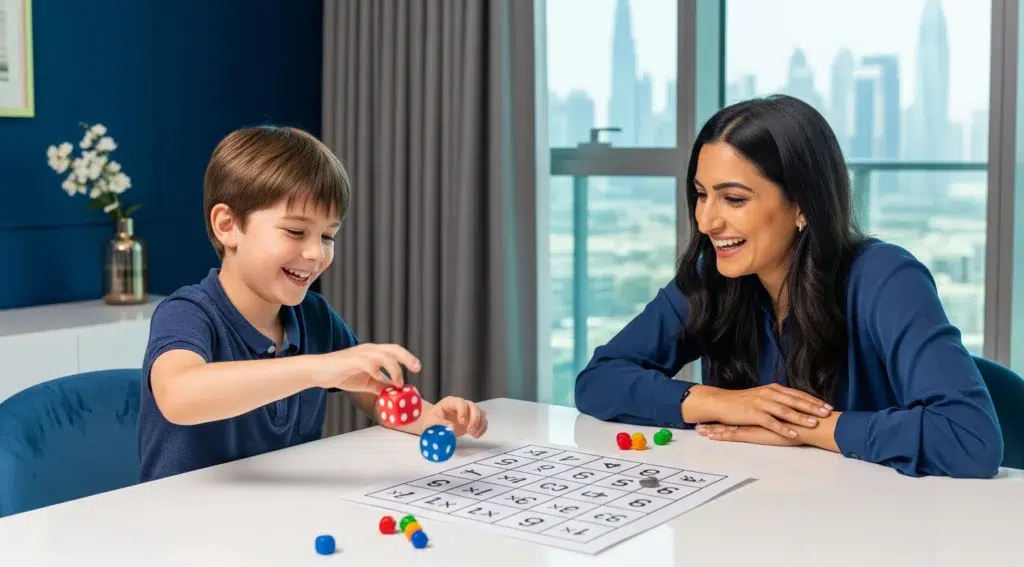How to Make Times Tables Fun: A Guide for Dubai Parents
For many of us, the phrase “times tables” brings back memories of monotonous chanting, stressful timed tests, and the sheer panic of being put on the spot. It’s a classic point of friction between parents and children, often turning homework time into a frustrating battle of wills.
But what if it didn’t have to be this way? What if learning multiplication could be a source of fun, connection, and real-world discovery for your family here in Dubai?

The truth is, while knowing times tables by heart is a crucial skill for primary maths, rote memorization alone isn’t the goal. The real goal is to build “number sense”—an intuitive understanding of how numbers work together. This guide is packed with creative games, practical Dubai-based examples, and top-rated apps to move beyond rote learning and help your child master their times tables with a smile.
Why Rote Memorization Isn't Enough
Simply chanting “6 times 8 is 48” doesn’t mean a child understands what it represents (6 groups of 8). Without this underlying conceptual understanding, children struggle to apply their knowledge to solve word problems, work with fractions, or tackle more advanced maths later on.
The key is to balance practice with play. The following strategies are designed to build both recall and understanding.
1. Gamify Multiplication: Low-Prep Games for Home
Turn practice into playtime with these simple, effective games.
Multiplication Snap: Create a deck of cards. Half the deck should have times tables questions (e.g., “4 x 5”) and the other half should have the answers (e.g., “20”). The rules are the same as classic Snap. It’s fast-paced, competitive, and gets children recalling facts under a little bit of fun pressure.
Dice Roll Race: You’ll need two dice. Have your child roll them both and multiply the two numbers together. The first person to shout the correct answer gets a point. You can use 10-sided or 12-sided dice for a greater challenge. This is great for practicing the 1-6 times tables initially, and then all the way up to 12.
Array City: Grab some LEGO bricks or any small building blocks. Call out a multiplication fact, like “3 x 4.” Your child’s mission is to build a rectangular “building” (an array) that is 3 blocks wide and 4 blocks long. Then, they can count the total number of blocks (12) to see the answer visually. This is a brilliant way to connect the abstract numbers to a concrete, physical representation.
2. Find the Maths in Everyday Dubai
Connecting multiplication to the real world is the best way to answer the question, “When will I ever use this?”
Shopping at the Souk (or Carrefour!): When you’re buying fruits or vegetables, ask questions. “We need 4 apples for our recipe, and they cost 3 AED each. How much will that be?” This makes multiplication a practical tool for everyday life.
Planning a Trip on the Metro: “We need to go 5 stops on the Metro. If each stop takes about 3 minutes, how long will we be on the train?”
Calculating Distances: “The sign says it’s 8 km to the next landmark. If we travel that distance 3 times this week, how many kilometres will we have driven?”
3. Leverage Technology: The Best Apps for Times Tables
A little bit of screen time can be incredibly productive when channeled correctly. Here are a few parent-approved apps that make practice feel like play:
Squeebles Times Tables: A UK-based app that’s very popular in British curriculum schools. Children can practice, take tests, and earn rewards to rescue Squeebles characters.
DoodleTables (DoodleLearning): This app uses an adaptive algorithm to create a personalized work program for your child, identifying their areas of weakness and helping them build skills gradually.
TTRockstars (Times Tables Rock Stars): Many Dubai schools have a subscription to this. It’s a fun, competitive platform where kids create a rockstar avatar and answer questions to earn coins and improve their “rock status.”
What if the Struggle is Deeper than Memorization?
You’ve tried the games, the apps, and the real-world examples, but your child still seems anxious, confused, or resistant. Sometimes, a reluctance to learn times tables isn’t about the multiplication itself, but a sign of a deeper gap in their foundational number sense.
If a child isn’t fully confident with addition and subtraction, or doesn’t intuitively understand concepts like grouping, they will find it nearly impossible to master multiplication. If you suspect this might be the case, forcing more flashcards will only increase their anxiety. This is a point where the personalized approach of a primary maths tutor in Dubai can be transformative. An expert can quickly diagnose the root cause of the struggle and build up their core number sense in a patient, one-on-one setting.
A tutor can help bridge these foundational gaps, making the fun games and activities we’ve discussed even more effective. For many children, a few targeted sessions with an expert primary school tutor can be the key to unlocking their confidence and turning “I can’t do it” into “I can.”
Conclusion: From a Chore to a Challenge
The goal is to reframe times tables. It’s not a boring chore to be endured; it’s a fun challenge to be mastered. By mixing in games, connecting it to their lives, and using technology wisely, you can take the pressure off and create a positive environment for learning.
Be patient, celebrate their effort, and focus on the small wins. Before you know it, you’ll have a confident child who sees maths not as a source of stress, but as a powerful tool for understanding the world.
If you are ready to provide your child with the personalized support they need to become a confident and successful mathematician, learn more about our primary tutoring programs.